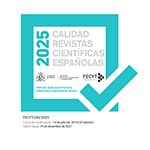Andamiaje y metacognición en las prácticas docentes: la dimensión afectivo-emocional del tutor
Resumen
Este trabajo aborda el análisis de la dimensión afectivo-emocional en el papel de andamiaje que desempeñan los tutores de prácticas a partir de las percepciones, las creencias y las expectativas expresadas por los estudiantes de posgrado de un máster universitario en español como lengua extranjera. El estudio se enmarca en el paradigma de investigación cualitativa y adopta la aproximación biográfico-narrativa con un planteamiento metodológico de carácter descriptivo-analítico fundamentado en la técnica de análisis de contenido. Partimos de los datos recogidos en cincuenta Memorias Fin de Prácticas, para cuyo procesamiento utilizamos el programa ATLAS.ti (versión 7.5.18). El análisis refleja la relevancia que se concede a la dimensión afectivo-emocional (46,42 %) en el perfil del tutor. La dimensión técnica alcanza un porcentaje cercano (43,75 %) y la dimensión formativa suma un 8,9 % de la frecuencia de citas. Las principales conclusiones sugieren que el análisis crítico de los procesos reflexivos sobre la acción docente ofrece una excelente base de retroalimentación para ir construyendo la propia identidad profesional –analizando los perfiles cognitivos, afectivos y motivacionales–..
Descargas
Descarga artículo
Licencia
La revista Didáctica. Lengua y Literatura, para fomentar el intercambio global del conocimiento, facilita el acceso sin restricciones a sus contenidos desde el momento de su publicación en la presente edición electrónica, y por eso es una revista de acceso abierto. Los originales publicados en esta revista son propiedad de la Universidad Complutense de Madrid y es obligatorio citar su procedencia en cualquier reproducción total o parcial. Todos los contenidos se distribuyen bajo una licencia de uso y distribución Creative Commons Reconocimiento 4.0 (CC BY 4.0). Esta circunstancia ha de hacerse constar expresamente de esta forma cuando sea necesario. Puede consultar la versión informativa y el texto legal de la licencia.










